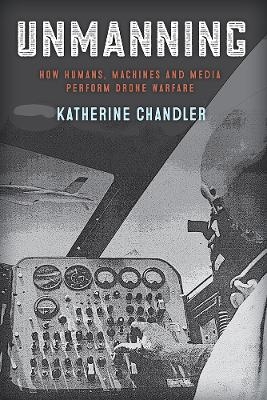
Unmanning
How Humans, Machines and Media Perform Drone Warfare
Seiten
2020
Rutgers University Press (Verlag)
978-1-9788-0974-1 (ISBN)
Rutgers University Press (Verlag)
978-1-9788-0974-1 (ISBN)
Studies the conditions that create contemporary unmanned platforms in the United States through a genealogy of experimental, pilotless planes from 1936-1992. Rather than primarily treat the drone through the War on Terror, this book instead shows how the assembled parts of drone aircraft prefigure targeted killing well before these events.
Unmanning studies the conditions that create unmanned platforms in the United States through a genealogy of experimental, pilotless planes flown between 1936 and 1992. Characteristics often attributed to the drone—including machine-like control, enmity and remoteness—are achieved by displacements between humans and machines that shape a mediated theater of war. Rather than primarily treating the drone as a result of the war on terror, this book examines contemporary targeted killing through a series of failed experiments to develop unmanned flight in the twentieth century. The human, machine and media parts of drone aircraft are organized to make an ostensibly not human framework for war that disavows its political underpinnings as technological advance. These experiments are tied to histories of global control, cybernetics, racism and colonialism. Drone crashes and failures call attention to the significance of human action in making technopolitics that comes to be opposed to “man” and the paradoxes at their basis.
Unmanning studies the conditions that create unmanned platforms in the United States through a genealogy of experimental, pilotless planes flown between 1936 and 1992. Characteristics often attributed to the drone—including machine-like control, enmity and remoteness—are achieved by displacements between humans and machines that shape a mediated theater of war. Rather than primarily treating the drone as a result of the war on terror, this book examines contemporary targeted killing through a series of failed experiments to develop unmanned flight in the twentieth century. The human, machine and media parts of drone aircraft are organized to make an ostensibly not human framework for war that disavows its political underpinnings as technological advance. These experiments are tied to histories of global control, cybernetics, racism and colonialism. Drone crashes and failures call attention to the significance of human action in making technopolitics that comes to be opposed to “man” and the paradoxes at their basis.
Katherine Fehr Chandler is an assistant professor in the Culture and Politics Program at the Walsh School of Foreign Service, Georgetown University. She received her PhD in rhetoric from the University of California, Berkeley.
Contents
Introduction
1 DRONE
2 American Kamikaze
3 Unmanning
4 Buffalo Hunter
5 Pioneer
Conclusion Nobody’s Perfect
Acknowledgments
Notes
Bibliography
Index
| Erscheinungsdatum | 02.04.2020 |
|---|---|
| Zusatzinfo | 19 b-w photos |
| Verlagsort | New Brunswick NJ |
| Sprache | englisch |
| Maße | 152 x 229 mm |
| Gewicht | 2 g |
| Themenwelt | Geisteswissenschaften ► Geschichte ► Allgemeine Geschichte |
| Geschichte ► Teilgebiete der Geschichte ► Militärgeschichte | |
| Mathematik / Informatik ► Informatik ► Theorie / Studium | |
| Technik | |
| ISBN-10 | 1-9788-0974-3 / 1978809743 |
| ISBN-13 | 978-1-9788-0974-1 / 9781978809741 |
| Zustand | Neuware |
| Informationen gemäß Produktsicherheitsverordnung (GPSR) | |
| Haben Sie eine Frage zum Produkt? |
Mehr entdecken
aus dem Bereich
aus dem Bereich
Schulbuch Klassen 7/8 (G9)
Buch | Hardcover (2015)
Klett (Verlag)
31,50 €
Buch | Softcover (2004)
Cornelsen Verlag
25,99 €



